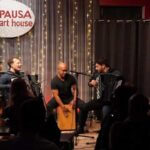Rutilio Grande, S.J., who will be beatified on Jan. 22, was a deeply committed priest with extraordinary pastoral gifts. This was apparent particularly in his efforts to empower the laity and bring the spirit of the Second Vatican Council—as well as the Latin American Bishops’ Conference in Medellín, Colombia—to life in impoverished El Salvador during the lead-up to that country’s civil war. Not content to impose solutions from above, Father Grande was committed to what Pope Francis would later call “the culture of encounter.” Because of his efforts to raise the consciousness of the poor and advocate for land reform, he and two parishioners were gunned down by a death squad in 1977 less than one month after Óscar Romero had been installed as archbishop of San Salvador. Father Grande’s assassination had a profound effect on Archbishop Romero, who spent the rest of his life speaking boldly and prophetically against oppression until, he, too, was killed by a death squad.
Father Grande’s work was possible because of the care and treatment he received for his mental health issues. Though a less known part of his biography, this is highly relevant in an age when so many struggle with their mental health. According to the National Alliance on Mental Illness, one in five Americans suffers from a mental illness in any given year. Despite the vast scope of this crisis, which has been exacerbated by the Covid-19 pandemic, there is significant stigma around mental health care, particularly in the church.
Rutilio Grande is just the intercessor we need as we seek to bridge the gap between the beautiful theory of church teaching on mental health care and its actual practice.
Our last three popes have spoken frequently about the dignity of those struggling with mental health issues including depression and addiction, and Pope Francis has spoken positively about his own experience seeing a psychoanalyst. But that attitude of compassionate care has been slow to…





